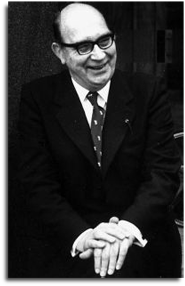

K A T E ‘ S P O E M S
I strongly object to the implication that feeling is in some way suspect as a basis for poetry nowadays. To me, now as at any other time poetry should begin with emotion in the poet, and end with the same emotion in the reader. The poem is simply the instrument of transference. No matter what else we ask of poetry, or what methods we choose to bring it about, it must fulfil this first function, or cease to be an art at all. I say this because it is very much in danger of being forgotten nowadays, and if it is forgotten, then it will be the fault of phrases like 'mere personal emotion'.
Philip Larkin 1956.
Philip Larkin 1956.
If I avoid abstractions such as are found in politics and religion it’s because they have never affected me strongly enough to become part of my personal life, and so to cease being abstractions. I suppose the kind of response I am seeking from the reader is. Yes, I know what you mean, life's like that; and for readers to say it not only now but in the future, and not only in England but anywhere in the world.
Philip Larkin; BBC Overseas Service, 20 August 1958
Philip Larkin; BBC Overseas Service, 20 August 1958
Unfortunately to write well entails enjoying what you are writing, and there is not much pleasure to be got from the truth about things as anyone sees it. What one does enjoy writing -what the imagination is only too ready to help with - is, in some form or other, compensation, assertion of oneself in an indifferent or hostile environment, demonstration (by writing about it) that one is in command of a situation, and so on. Separating the man who suffers from the man who creates is all right - we separate the petrol from the engine - but the dependence of the second on the first is complete. Again, the imagination is always ready to indulge its fetishes - being classic and austere, or loading every rift with ore - with no responsible basis or rational encouragement. Very little that catches the imagination, in short, can get its clearance from either the intelligence or the moral sense. And equally, properly truthful or dispassionate themes enlist only the wannest support from the imagination. The poet is perpetually in that common human condition of trying to feel a thing because he believes it, or believe a thing because he feels it. Philip Larkin

